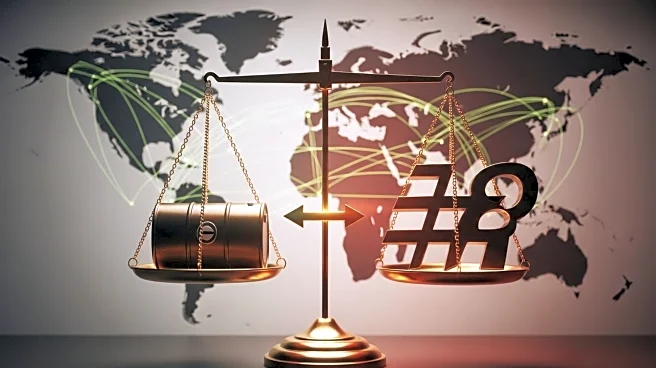What's Happening?
The United States has announced an additional 25 percent tariff on Indian exports due to India's continued purchase of Russian oil. This decision, confirmed by the U.S. Department of Homeland Security, raises the total tariffs on Indian goods to 50 percent. India, a major importer of Russian oil, has increased its imports from Russia significantly since the full-scale invasion of Ukraine in February 2022. Indian refiners are expected to reduce their Russian oil purchases from an average of 1.8 million barrels per day to between 1.4 and 1.6 million barrels per day. This reduction is anticipated to constrain Russia's ability to finance its military operations in Ukraine.
Why It's Important?
The U.S. tariffs on India highlight the geopolitical tensions surrounding energy trade and the ongoing conflict in Ukraine. By targeting India's imports, the U.S. aims to pressure Russia economically by reducing its oil revenue, which is crucial for funding its military activities. This move could strain U.S.-India relations, as India is a significant trading partner and a key player in the global energy market. The reduction in Russian oil purchases by India could lead to shifts in global oil supply chains, potentially affecting oil prices and energy security worldwide.
What's Next?
India's response to the increased tariffs will be closely watched, as it may seek alternative oil suppliers or negotiate with the U.S. to mitigate the impact on its economy. The reduction in Russian oil imports by India could lead to increased competition among other oil-exporting nations to fill the gap. Additionally, the U.S. may continue to leverage economic measures to influence global energy dynamics and pressure Russia. The situation could also prompt discussions within international forums about energy security and geopolitical stability.
Beyond the Headlines
The imposition of tariffs and the reduction in Russian oil imports by India could have broader implications for global energy policies and alliances. It may accelerate the transition towards renewable energy sources as countries seek to reduce dependency on geopolitically sensitive oil supplies. Furthermore, the economic impact on Russia could lead to internal challenges, affecting its domestic policies and international relations. The situation underscores the interconnectedness of global energy markets and the influence of geopolitical strategies on economic decisions.











